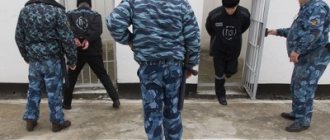Criminal Code of the Russian Federation in the latest edition:
Article 127 of the Criminal Code of the Russian Federation. Unlawful imprisonment
1. Illegal deprivation of a person’s liberty, not related to his abduction, -
shall be punishable by restriction of freedom for a term of up to two years, or forced labor for a term of up to two years, or arrest for a term of three to six months, or imprisonment for a term of up to two years.
2. The same act committed:
a) by a group of persons by prior conspiracy;
b) has become invalid. — Federal Law of December 8, 2003 N 162-FZ;
c) with the use of violence dangerous to life or health;
d) using weapons or objects used as weapons;
e) in relation to a known minor;
f) in relation to a woman who is known to the perpetrator to be pregnant;
g) in relation to two or more persons, -
shall be punishable by forced labor for a term of up to five years or imprisonment for a term of three to five years.
3. Acts provided for in parts one or two of this article, if they were committed by an organized group or caused by negligence the death of the victim or other grave consequences, -
shall be punished by imprisonment for a term of four to eight years.
Return to the table of contents of the document: Criminal Code of the Russian Federation in the latest edition
Services
What I owe is written down in the tax code, everything I don’t owe is written down in the criminal code. The rest is at my discretion!..
Conflicts in the field of corporate law are among the most dangerous in the field of business law. The internal corporate documentation of the Company must be as clear and precise as possible and indicate the rights and obligations of the participants (shareholders) of the Company. If disagreements have already appeared, the partners should sit down at the negotiating table and try to find a way out of the current situation: from dividing the business to distributing powers. Often, controversial issues that arise among shareholders or co-owners turn out to be purely legal, and in the presence of an intermediary lawyer, the partners quickly come to an agreement.
Legal assistance from lawyers in relations with contractors
All documents in relations with counterparties must be carried out through lawyers. On the one hand, it may seem that detailed elaboration of all projects, actions, and materials increases the level of bureaucratization of business. But this is only at first glance. The main goal of a detailed study (analysis) of all counterparty documents by lawyers is to minimize risks and avoid contact with unscrupulous counterparties. Involving a lawyer in negotiations with counterparties and the client on the issue of concluding an agreement (contract) and the procedure for its implementation allows the client to receive qualified legal assistance directly at the conclusion of the contract, which will help avoid mistakes and the need to correct them.
Providing debt collection services (collection of receivables)
Recently, the main threat to business security is loan obligations and the potential threat of bankruptcy. The more time passes from the beginning of disagreements, the more difficult it is to come to an agreement. Efficiency in resolving these issues is always welcome here.
Representation of client interests in tax disputes
With the adoption of the Tax Code of the Russian Federation, the rights of the taxpayer expanded significantly, in particular, the right to entrust the representation of their interests through authorized representatives - both legal entities and individuals - appeared.
Quite often there is a situation when a company has to solve problems with tax authorities that arise from the company’s business activities. And, as a rule, the company’s in-house lawyers do not have sufficient knowledge and experience to represent the company’s interests in the tax authorities.
In this situation, the taxpayer must contact a qualified specialist specializing in resolving tax disputes.
Representation of interests in tax authorities, and representation of client interests in Arbitration Courts is one of the main areas of activity of lawyer Amasyants E.A. Within this area, the lawyer provides the following types of services:
- Legal analysis of tax situations that arise for the client when carrying out financial and economic activities
- Tax consultation
- Optimization of taxation by choosing the appropriate types of relationships with counterparties (both when concluding an agreement and by changing the terms of already concluded agreements), the most profitable determination of the composition of costs included in the cost, as well as by determining accounting methods that allow reducing the tax base .
- Protection and representation of the interests of the customer (client) in relations with tax authorities during on-site tax audits.
Representation by a lawyer of the interests of business entities in their relations with law enforcement agencies
Law enforcement agencies carry out scheduled and unscheduled inspections of the activities of organizations and institutions in order to identify signs of a crime in the economic sphere. Such inspections are often associated with the seizure of documentation from the organization’s premises, which can significantly complicate the organization’s subsequent activities and even create a real threat to the complete cessation of activities. The activity of a lawyer at this stage is especially important, since his participation allows the client to avoid a number of mistakes. The main responsibility for the activities of the organization lies with the manager and chief accountant, and therefore legal protection should primarily be provided to these individuals. The right to use the assistance of a lawyer at the stage of an inspection is confirmed by the resolution of the Constitutional Court of the Russian Federation of June 27, 2000, according to which the right to use the assistance of a lawyer (defender) at the pre-trial stages of criminal proceedings is not allowed in all cases where the rights and freedoms of a person are significantly affected or may be affected by actions and measures related to criminal prosecution.
Preventive work
In modern conditions of economic activity in Russia, a businessman or merchant is constantly at risk of being deceived. Here it is necessary to draw the manager’s attention to the fact that the condition for normal and conflict-free activity of the organization must be, first of all, the own vigilance of the company’s management, the prudence and caution of the businessman himself. Unfortunately, proper vigilance and caution cannot always be demonstrated where it is needed. That is why at this stage you should hire a lawyer who will develop certain criteria for assessing your own steps and the steps of your partners when concluding all kinds of contracts, agreements, and agreements. These own steps are divided into:
- Actions to prevent dishonest actions on the part of business partners;
- Actions to prevent dishonest actions on the part of management itself, other managers and employees of the company.
An example from judicial practice
Citizen Petrov, after a quarrel with his wife with accusations of treason, locked her in his own apartment. He took the keys to the front door and his personal mobile phone. Petrov turned off his landline phone. The victim was locked up for one month and was able to leave the apartment only after a visit from the local police officer. He appeared after a statement from neighbors who heard screams for help from the apartment.
During the investigation, it was also found out that the victim was tied to the radiator while Petrov was away from home. Petrov was found guilty by the court of committing a crime in accordance with Part 1 of Art. 127 of the Criminal Code of the Russian Federation and sentenced to forced labor for a period of two years.
If you have any questions about the topic of the article, ask them in the comments
How much do they charge for kidnapping?
What responsibility for the kidnapping will be assigned by the court depends on the specifics of the crime. There are three possible cases, each of which is devoted to its “own” part of the article. 126.
General composition (part 1)
This is a kidnapping that does not have qualifying (aggravating) features. Punishable by forced labor or imprisonment for five years. The punishment is determined by the court taking into account the characteristics of a particular case.
Qualifying staff (part 2)
The aggravating features of the unlawful act include the following:
Committed by two or more persons who have agreed in advance to interact. Causing harm (from mild to severe) to the health of the victim or her loved ones, threats of violence. Use of weapons or objects of torture (hot iron, rods, needles driven under nails, etc.). Kidnapping of a minor or a pregnant woman (if the attacker knew about the age or “interesting situation” of the potential victim). Repeated kidnapping (a series of illegal acts committed by one person or group of people).
Responsibility for a crime classified under the second part of Art. 126, is imposed in the form of imprisonment for 5-12 years. An additional penalty in the form of restriction of freedom for a two-year period is possible.
Detaining a person for selfish reasons deserves special attention: demanding a ransom, any actions or concessions in response to release. Self-interest is recognized as an aggravating factor, and for attempts at extortion, the attacker is assigned additional “punishment” under Art. 163 of the Criminal Code of the Russian Federation.
Particularly qualified personnel (part 3)
This is the most serious category of kidnapping, meeting any of two legal criteria:
The act was committed by an organized group, i.e. a certain collection of people who gathered and coordinated their work to achieve criminal goals. The victim was seriously harmed or the actions of the abductors led to her death.
The punishment for crimes with this composition is imprisonment for up to 15 years. Additionally, the court may restrict the freedom of attackers for two years.
Important! Art. 126 does not cover cases where a person is kidnapped for the purpose of murder. Such an act is qualified by the Criminal Code of the Russian Federation as murder.





